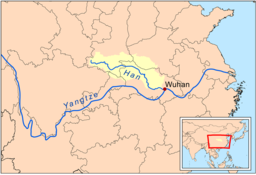Hanshui
| Han River (汉江) | |
| Han Jiang / Hanshui | |
| Country | China |
|---|---|
| Regions | Shaanxi, Hubei |
| Part of | Yangtze River basin |
| Tributaries | |
| - left | Xun, Dan, Bai River (China), Fushui River |
| - right | Du, Chi, Nan, Muma |
| Cities | Hanzhong, Ankang, Shiyan, Xiangyang, Wuhan |
| Source | Near Hanzhong |
| - location | Qin Mountains, Shaanxi |
| - elevation | 580 m (1,903 ft) |
| - coordinates | 33°08′32″N 106°49′42″E / 33.14222°N 106.82833°E |
| Mouth | Yangtze River |
| - location | Wuhan, Hubei |
| - elevation | 75 m (246 ft) |
| - coordinates | 30°33′52″N 114°17′30″E / 30.56444°N 114.29167°ECoordinates: 30°33′52″N 114°17′30″E / 30.56444°N 114.29167°E |
| Length | 1,532 km (952 mi), Northwest-southeast |
| Basin | 174,300 km2 (67,298 sq mi) |
| Discharge | |
| - average | 2,156 m3/s (76,138 cu ft/s) |
| - max | 105,000 m3/s (3,708,040 cu ft/s) |
|
Map highlighting watershed of the Han Jiang
|
|
| Hanshui | |||||||||
| Traditional Chinese | |||||||||
|---|---|---|---|---|---|---|---|---|---|
| Simplified Chinese | |||||||||
| Literal meaning | Han River | ||||||||
|
|||||||||
| Traditional Chinese | |||||||||
| Simplified Chinese | |||||||||
| Literal meaning | Han River | ||||||||
|
|||||||||
| Transcriptions | |
|---|---|
| Standard Mandarin | |
| Hanyu Pinyin | Hànjiāng |
| Wade–Giles | Han Chiang |
| Transcriptions | |
|---|---|
| Standard Mandarin | |
| Hanyu Pinyin | Hànshuǐ |
| Wade–Giles | Han-shui |
The Han River, also known by its Chinese names Hanshui and Han Jiang, is a left tributary of the Yangtze in central China. It has a length of 1,532 kilometers (952 mi) and is the longest tributary of the Yangtze system.
The river gave its name to the Han dynasty and, through it, to the Han Chinese, the dominant ethnicity in China and the most populous ethnic group in the world. It is also the namesake of the city of Hanzhong on its upper course.
The headwaters of the Han flow from Mount Bozhong in southwestern Shaanxi. The stream then travels east across the southern part of that province. Its highland valley—known as the Qinba Laolin—divides and is protected by the Qinling or Qin Mountains to its north and the Dabashan or Daba Mountains to its south. The main cities are Hanzhong in the west and Ankang in the east. It then enters Hubei. It crosses most of Hubei from the northwest to the southeast, falling into the Yangtze at the provincial capital Wuhan, a city of several million inhabitants. The merging rivers divide the city of Wuhan into three sections: Wuchang in the south, Hankou to the northeast of the confluence, and Hanyang to its southwest. The area surrounding the confluence is known as the Jianghan Plain.
Apart from a few major basins, such as the area around Hanzhong, the highlands of the Han were covered in primeval forests as late as the 19th century. The Nanshan Forest covered the northern slopes; the Bashan Forest, the southern.
Danjiangkou Dam was constructed on the Han River in northern Hubei in 1958. It has been heightened since. The Danjiangkou Reservoir created thereby is now used as part of the South–North Water Transfer Project.
...
Wikipedia


